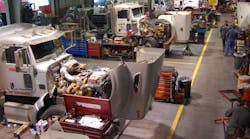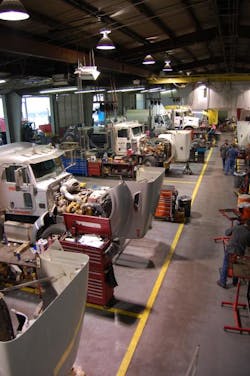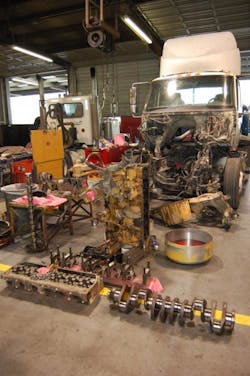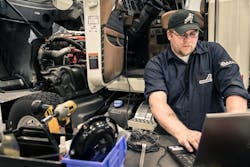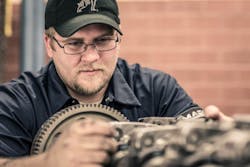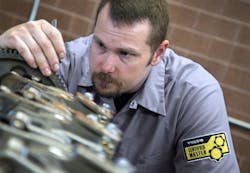The technician shortage is an issue never far from trucking’s thoughts, but it’s an issue that’s even more resistant to short-term solutions than the truck driver shortage – largely because of the highly complex nature of today’s commercial trucks.
Indeed, the U.S. Department of Labor reports there will be approximately 1.4 million jobs in the diesel, automotive, motorcycle and marine industries in the U.S. by 2020 – just a scant six years from now – and more than a few folks are wondering where the skilled professionals needed to fill those jobs will come from.
I talked to Ray Wheeling, VP of industry alliances at the Universal Technical Institute (UTI) by email this week about how his organization is trying to forge deeper connections with truck and engine OEMs to help attract more folks – especially younger folks – into the diesel technician ranks.
“The technician shortage is consistent across the diesel and auto sectors – it’s a growing problem for the entire transportation industry,” he explained to me. “Our manufacturing partners and their dealerships are currently in need of hundreds of technicians, on average, which is why they partner with us to train the next generation of highly-skilled technicians.”
While he believes it’s not harder to recruit diesel technicians, it does require a “solid effort” from manufacturers and their dealers.
“If you want to recruit the best techs, you need to be a part of their training from day one,” Wheeling explained. “Recruiters need to educate students about the opportunities available with their brand, while providing them with personal support and guidance throughout their training program.”To that end of helping meet the growing demand for highly-skilled diesel technicians, UTI recently expanded its manufacturer-specific advanced training (MSAT) diesel programs.
Wheeling noted that after graduating its first class of students earlier this year, the Peterbilt Technician Institute (PTI) has expanded to a second UTI campus in Lisle, IL; building on UTI’s initial partnership with Peterbilt Motors Co. started last year at UTI’s Dallas campus.
He said PTI provides the Peterbilt dealer network with a great resource for staffing their service areas with qualified, highly trained technicians that will ultimately result in greater shop productivity and profitability, while helping ensure the highest possible levels of customer satisfaction.
In the same vein, Daimler Trucks North America (DTNA) also recently expanded its Finish First training program to the UTI campus in Lisle – a program that has also been available at UTI's Avondale, AZ, campus since 2008 –to meet the aforementioned growing demand for qualified truck technicians at DTNA dealerships nationwide.
Technicians graduate from that 12-week Finish First program with full Freightliner and Western Star certifications, providing an important advantage to hiring dealerships as they can immediately begin working and providing customer value in the shop.
Wheeling told me it’s those kinds of focused efforts that will be critical to attracting the next generation into the trucking industry’s shops.“We need to educate young people about the growing demand for skilled technicians and the opportunities available throughout the transportation industry,” he stressed.
“A four-year degree is not the only way to a great career, and it’s time that we reduce the stigma around this type of ‘dirty job,’” Wheeling emphasized. “The students who thrive in our programs are usually hands-on learners who have a passion for large trucks and engines, and we want to not only educate them on the complex, sophisticated machines under the hood, but the well-paying careers and success they can achieve.”
That’s also true of the support staff backing up technicians, too, which is another reason OEM’s are broadening their in-house training programs.
For example, Mack Trucks noted that its “Mack Trucks Academy” program recently received Continuing Automotive Service Education (CASE) accreditation from the National Institute for Automotive Service Excellence (ASE) – an accreditation achieved after evaluation against established industry standards, ensuring that Mack’s continuing education training corresponds to “best practices” at use within the vehicle service industry."The accreditation from CASE signifies that the Mack Trucks Academy is committed to offering technicians best-in-class training, offering them an opportunity to increase their knowledge and advance their careers – and career advancement can be appealing to potential technicians and consequently become a deciding factor in their career choice,” John Walsh, Mack’s VP of marketing, stressed to me an email.
“Because technicians are being trained in specific service areas, they are learning the necessary skills to help identify and correct issues that arise on a vehicle, contributing to increased uptime,” he added.
Walsh also pointed out that such training programs play an integral part in Mack’s customer support strategy to help prepare dealer technicians and service personnel to back up Mack’s Pedigree Uptime Protection program introduced two years ago, which encompasses service management, maintenance plans and vehicle diagnostics.
All told, Mack Trucks Academy provides training for 14 different dealership job roles, including sales, parts, service and technician, as well as training for drivers, with courses available through e-learning and instructor-led classes conducted at seven locations in the U.S. and Canada.Volvo Trucks Academy – the training arm of Volvo Trucks (the brother company of Mack Trucks) – also received the same CASE accreditation mark, which Göran Nyberg, president of Volvo Trucks North American sales & marketing, is critical for highlighting to customers the quality of the personnel assigned to work on their vehicles.
“Exceptional training is vitally important for the success of our dealer network and drives a greater value of ownership for our customers,” he stressed. “Accreditation also validates the quality of training we provide to customers who operate their own service networks.”
These things aren’t just fluff either, as Bill Jacobelli, senior VP-maintenance at Penske Truck Leasing, will tell you. ”Penske has high standards for truck fleet maintenance training programs and we have strongly supported CASE accreditation in our internal certification training program for several years,” he said in a statement. ”We commend Volvo on their ... shared commitment to following industry standards for sound instructional development of fleet maintenance technicians.”
Volvo – like Mack as well – also continues foster the development of new technicians through a partnership with WyoTech, another national vocational training school, with students in the institution’s Diesel Advanced Technology Education program receiving training tailored specifically for Volvo and Mack chassis, powertrain, emissions, electronics and electrical systems in preparation for an entry-level position servicing and repairing those truck brands.
Going forward, though, UTI’s Wheeling believes a change will be needed to high school curriculums and post-graduation job focus to really create a lasting shift in the technician shortage situation.
“All of UTI’s programs are rooted in science, technology, engineering and math (STEM) and the trucking industry has evolved significantly over the last few years and working on these types of machines requires much more than brawn,” he stressed.
“Electronic diagnostics is a big area of focus now,” Wheeling pointed out. “Some engines, for example, now have more than 40 unique sensors – and techs need to understand how to diagnose the problem before they even get to the mechanical part.”
